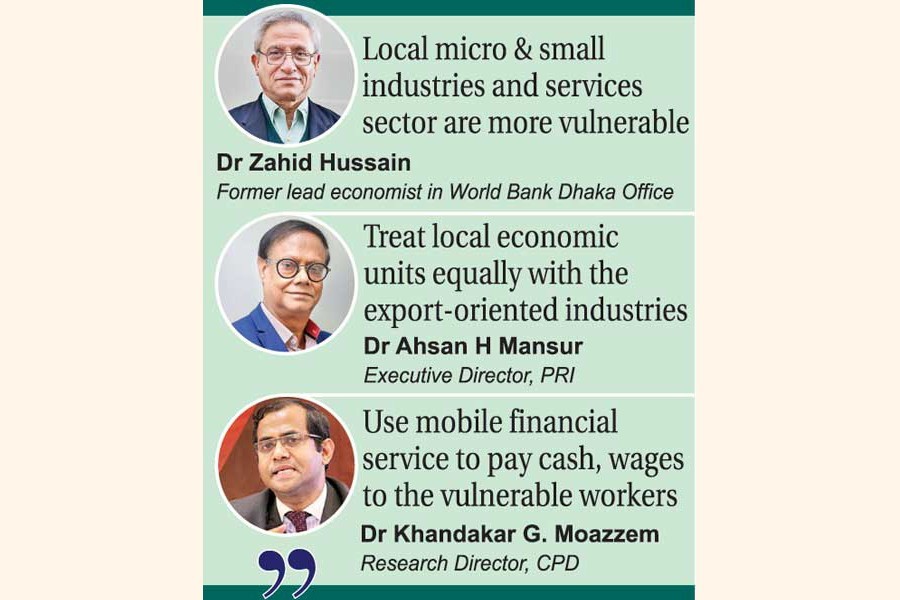Economists on Monday urged the government to provide financial support to local industries and service sectors to help those cushion the impact of the new coronavirus.
The Tk 50-billion package for the export-oriented sector is laudable, but other domestic industries and services sector that create millions of jobs and economic opportunities should not be left out, they argued.
On March 25, the government announced the stimulus package so that export sectors, including clothing, can pay workers and employees.
Bangladesh is home to 8.07 million macro, micro and medium-sized business units across the country, according to the Economic Census 2013 of the state-run Bangladesh Bureau of Statistics (BBS).
Among the dominant activities, the wholesale and retail trade accounts for 45.91 per cent, followed by the transportation and storage at 13.65 per cent, the manufacturing at 11.76 per cent, hospitality and food services at 4.77 per cent, education at 3.93 per cent, construction sector at 2.39 per cent, and the agriculture, forestry and fishing 2.90 per cent.
Large job-creating sectors--poultry and livestock, agro-processing, hotel and restaurant, transportation, construction, education, shops and malls, trading businesses--- have been hit hard by the impact of the Covid-19, the illness caused by the virus and the preventative restrictions
Former lead economist at the World Bank Dr Zahid Hussain said the workers and employees of local micro, small industries, and services industry are more vulnerable to the crisis than export-oriented formal sector.
"Millions of workers and staffers have already become jobless. Besides, if the Covid-19 crisis is prolonged, many more will lose job and income. So, these people should get the priority when it comes to financial support," he told the FE.
For example, the daily employment of these section of people is so important that they must get out looking for work to feed their family rather than staying at their homes as per advice of the authorities.
There may be a 10 per cent possibility of mortality in the case of coronavirus infection, but they are sure to die from starvation if the situation continues like this, he added.
Dr Hussain urged the government to announce a financial support package for the local informal and formal industries and service sectors as early as possible to avoid creating a society of the unemployed.
Executive director of the Policy Research Institute of Bangladesh, or PRI, Dr Ahsan H Mansur advised the government to announce a package for local enterprises, businesses and service providers aiming to facilitate monthly payment and daily wages of millions of workers and employees.
"The industries and service sectors that meet local demand are very important for our economy. The coronavirus crisis has left many of them out of work," he said.
"So, if the government does not come forward to prop such sectors, both employees and employers will be in trouble," he added.
He suggested the government become fair and treat local business establishments equally.
Research director of the Centre for Policy Dialogue, or CPD, Dr Khandakar Golam Moazzem said unless the government backed smaller firms it would reflect an unfair attitude on its part.
"Some 69 per cent of the country's total economic establishments are micro, and medium industries. Nearly 47 per cent of job is created by these sectors and sub-sectors. So, the government should respond immediately to the needs of such entities," he said.
He suggested the government use mobile financial services to provide cash support, wages and monthly payment to the vulnerable workers and staffers of the formal and informal economic units of the country.
The economists agreed that the government could offer concessional loans for continuing their operations and payment to the employees, suspend tax payment for a certain period, and extend other forms of fiscal support.


